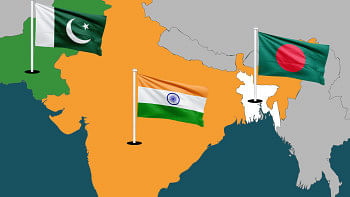Govt rolls out project to make economic plans pro-poor
The government has launched a project to give a pro-poor bent to key state institutions responsible for formulating economic policies.
Called the Support to Inclusive and Sustainable Planning (SSIP) Project, the $4.7 million-worth scheme is meant for implementation between June 2013 and December 2016.
Of the sum, the United Nations Development Programme (UNDP) will provide $2.2 million, the UN Department of Economic and Social Affairs $300,000 and the UN Poverty and Environment Initiative $200,000.
The remaining $2 million is yet to be mobilised, according to a presentation made at a workshop at the National Economic Council yesterday.
Under the project, the capacity of the national planners at the General Economics Division (GED) of the planning commission, the finance ministry, Bangladesh Bank and Bangladesh Bureau of Statistics will be enhanced, said Shamsul Alam, a member of the GED.
Planning Minister AHM Mustafa Kamal said the project is linked with accelerating economic growth and achieving Millennium Development Goals. “Development goal is the central target of the project, so we can serve the people.”
Pauline Tamesis, country director of UNDP, said planning for progress is perhaps now more critical than ever before as “we seek to secure development gains, address persistent remaining challenges and move toward a middle-income country status with equity for Bangladesh”.
“As we near the terminal date of the MDGs and look to renew our commitment for our development goals in Bangladesh for the post-2015 period, enhancing the quality of data and skill sets of the civil servants and the calibre of planning will lay the foundation for the coming years.”
The UNDP official termed the project timely and cognisant of the need, adding that it aims to build capacity and pro-poor economic modelling, strengthen inclusive and sustainable development plans and continue to support MDGs and the post-2015 monitoring and formulation.
The project is ready to provide technical assistance in the formulation of the background papers for the Seventh Five Year Plan as well. During a technical session, Tofail Ahmed, a local government specialist, said the national plan cannot directly be linked with the local plan “as the problems are unique”.
Ahsan H Mansur, executive director of the Policy Research Institute, who chaired the technical session, said policy planners must actively work together, share knowledge and cooperate for desired effect. “It will not only benefit all of the government agencies involved, but also save a lot of resources.” He also said high-level planning commitment is needed to solve problems at local levels.
Suraiya Begum, secretary of the Statistics and Informatics Division, Bhuiyan Shafiqul Islam, secretary of the Planning Division, and Naquib Bin Mahbub, national project director of SSIP, also spoke.

 For all latest news, follow The Daily Star's Google News channel.
For all latest news, follow The Daily Star's Google News channel. 



Comments